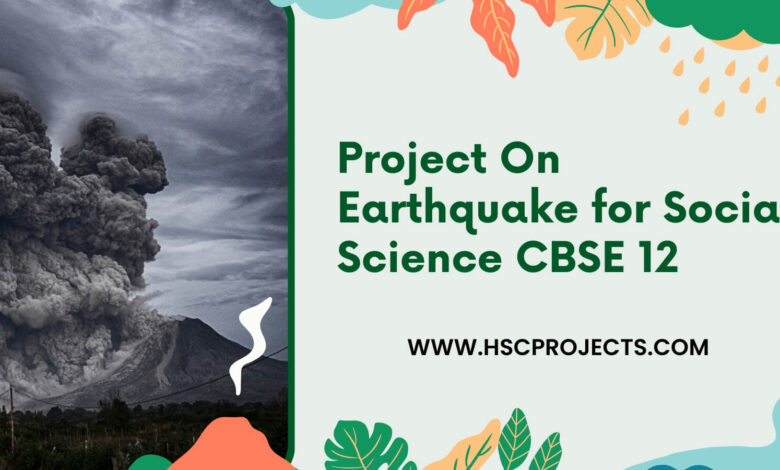
Project On Earthquake For Social Science CBSE 12
Acknowledgment
Please accept my sincere appreciation for all of your help as I worked to finish this seismic research project. First, I’d want to express my gratitude to my Social Science professor for giving me the chance to expand my knowledge in this area.
My thanks also go out to my folks, who have been very helpful and encouraging throughout during the course of our endeavour. Their unfailing advice and help have been crucial to my success.
In addition, I’d want to show my appreciation to the numerous specialists and researchers who have devoted their lives to learning more about earthquakes; it is because to their efforts that I was able to compile the extensive background knowledge I employed in my work.
Finally, I’d want to express my gratitude to everyone whose help was essential to the success of this project, whether their contributions were large or little.
Introduction To Earthquakes

When the crust of the Earth shifts quickly, releasing energy in the form of seismic waves, a natural catastrophe known as an earthquake occurs. Earthquakes are one of the most catastrophic natural catastrophes because the waves they generate may inflict major damage to buildings, infrastructure, and human lives.
Multiple variables, including the shifting of tectonic plates, eruptions of volcanoes, and even human activities like mining and drilling, contribute to earthquakes. Earthquakes occur when these forces cause the Earth’s crust to move.
Some earthquakes are quite mild and cause just slight vibrations, while others are catastrophic and kill thousands and cause extensive damage. Haiti, Japan, and Nepal are just a few of the places on Earth where earthquakes have inflicted devastating devastation in recent years.
Understanding earthquakes and the factors that contribute to, and mitigate, their effects is crucial. Learning more about earthquakes can help us prepare for them, lessen their toll on lives and property, and react more efficiently if and when they strike.
History Of Earthquakes
Ancient records and artefacts document the aftereffects of earthquakes, proving that they have been a part of human history for thousands of years. In ancient Greece, the deity Poseidon was blamed, whereas in China, the movement of dragons under the Earth’s surface was blamed.
British geologist John Michell and French naturalist Georges-Louis Leclerc conducted the first efforts at a scientific study of earthquakes in the 18th century. However, seismology, the study of earthquakes and seismic waves, did not begin to develop as a discipline of scientific research until the nineteenth century.
The creation of the seismograph in the latter half of the 19th century was a major step forward in our understanding of earthquakes. Scientists were able to get a better knowledge of the origins and impacts of earthquakes because to this instrument’s precise measurements of earthquake magnitude and location.
A better knowledge of earthquakes and their effects has resulted from the progress made in seismology and related sciences over the twentieth century. Scientists today are still investigating earthquakes in an effort to better detect and prepare for these potentially devastating natural disasters.
Causes Of Earthquakes
Many different things, both natural and manmade, may trigger abrupt movement of the Earth’s crust, which is what causes earthquakes. Common triggers for earthquakes include:
Tectonic plate movement: The Earth’s crust is made up of a number of tectonic plates, and these plates are in a continual state of motion and change. Earthquakes may occur when these plates grind or crash against one another.
Volcanic activity: Earthquakes may be triggered by volcanic activity, since the pressure of magma moving deep inside the Earth can be felt on the surface.
Human activities: Mining, drilling, and the building of huge dams are all examples of human activity that may disrupt the natural condition of the Earth’s crust and increase the likelihood of earthquakes.
Meteorite impacts: Large meteorites or asteroids striking the Earth may generate strong earthquakes, however such events are very unusual.
Many things may trigger an earthquake, but tectonic plate movement is the most common. The kind of plate border, the depth of the earthquake, and the geology of the region all have a role in determining both the location and frequency of earthquakes.
Measurement Of Earthquakes
Understanding the origins, impacts, and hazards of earthquakes relies heavily on accurate seismic measurement. In order to quantify earthquakes, seismographs—instruments designed to detect and record seismic waves—are often used.
When seismic waves travel through the Earth’s crust, they generate vibrations that may be detected by seismographs. A seismogram records these tremors and reveals data about the earthquake’s size, location, and duration.
The Richter scale is often used to report the magnitude of an earthquake. An increase in magnitude by one point on the Richter scale corresponds to a tenfold increase in seismic energy.
The magnitude of the earthquake is insignificant compared to the magnitude of the magnitude of the magnitude. In terms of destruction, shallower earthquakes (measured in km) tend to be more destructive than deeper ones. Latitude and longitude coordinates are often used to describe the epicentre of an earthquake.
Scientists can learn more about earthquakes and their effects if they take precise measurements. The capacity to forecast and prepare for earthquakes, which may inflict significant damage, can be greatly enhanced by the data presented here.
Preparedness For Earthquakes
Because earthquakes may happen at any time, it’s important for people and communities to be ready for them. Important things to do to be ready for an earthquake are:
Creating an emergency plan: Making preparations for an emergency means understanding where to take shelter in your house or place of business, how to get in touch with loved ones and how to turn off essential services like gas and electricity.
Stocking emergency supplies: Prepare for the possibility of an earthquake by stocking up on food, water, first aid supplies, and other necessities that will allow you to stay alive for many days.
Securing your home or workplace: Preparing your house or place of business for an earthquake may require reinforcing the building’s structure as well as securing loose items such as furniture and appliances.
Participating in drills and exercises: Individuals and groups may benefit from regular earthquake drills and exercises by practising response procedures and assessing their level of preparedness.
Staying informed: Knowledge is power, so make sure you’re up-to-date on earthquake danger in your region and listen to official warnings and alarms.
Taking these measures can help individuals and communities reduce the damage caused by earthquakes and keep people safe. Even though we can’t know when an earthquake will happen, we may take precautions to lessen its impact.
Response To Earthquakes
In the case of an earthquake, it is crucial to act quickly and efficiently in order to reduce casualties and property loss. Key actions taken in reaction to an earthquake include:
Checking for injuries and damages: After an earthquake, it is important to rapidly check for injuries and evaluate the damage to buildings and infrastructure.
Evacuating if necessary: If your house or place of business has been damaged or is hazardous, you should escape to a safe area and follow the instructions of local authorities.
Communicating with loved ones: Sharing your location and safety with loved ones is a top priority.
Responding to aftershocks: Reacting to aftershocks After an earthquake, it’s not uncommon for aftershocks to occur, and they may occasionally be just as powerful as the first tremor. Be ready to seek refuge or evacuate again if ordered to do so.
Assisting others: Those who are hurt or in need of aid should be helped if at all feasible.
Adhering to official directives: Do what local authorities say, and be ready to modify your approach if necessary.
Individuals and communities may lessen the damage and suffering caused by earthquakes by acting swiftly and competently in response to them.
Impacts Of Earthquakes
Individuals, communities, and ecosystems may all suffer serious consequences after an earthquake. Earthquakes may have several negative effects, including:
Deaths and injuries: Earthquakes may be devastating in locations where infrastructure and structures are not prepared for the effects of tremors.
Damage to buildings and infrastructure: Buildings, bridges, and roads may all be severely damaged by an earthquake, which can have a major impact on trade and transportation.
Displacement of populations: In certain circumstances, earthquakes cause population displacement when residents are compelled to evacuate their houses in search of safety.
Economic impacts: Significant economic effects, such as the destruction of buildings and the interruption of supply systems, may result from earthquakes.
Environmental impacts: The environment may be negatively impacted by earthquakes in a number of ways, including landslides, liquefaction of the ground, and changes to the quality of soil and water.
Individuals and communities may better prepare for earthquakes and take efforts to lessen their consequences if they have a better grasp of the possible implications of these occurrences. It might include things like updating safety regulations and infrastructure, preparing for and stockpiling times of crisis, and installing monitoring equipment.
Psychology Of Earthquakes
The psychological effects of earthquakes on people and communities may be devastating. The following are examples of frequent psychological reactions to earthquakes:
Anxiety and fear: Even those who have experienced earthquakes previously might be startled by its suddenness and unpredictability.
Post-traumatic stress disorder (PTSD): Some survivors of an earthquake may go on to acquire post-traumatic stress disorder (PTSD), characterised by symptoms include reliving the experience in vivid detail, having dreams about it, and avoiding triggers associated with it.
Depression: People who have suffered severe loss or disruption as a consequence of an earthquake may be more susceptible to developing depressive symptoms after the quake.
Tension levels rise: Earthquakes may cause tension and a heightened feeling of vulnerability even in those who don’t suffer considerable psychological anguish.
Community resilience: Although earthquakes may have profound effects on people’s psyches, they also have the potential to strengthen communities’ ability to bounce back from adversity and come together in the wake of catastrophe.
People and communities should be prepared for the psychological effects of earthquakes and reach out for help when they need it. Counselling services, support groups, and other mental health resources may all benefit from your research.
Case Studies Of Earthquakes
Numerous significant earthquakes have occurred at various times throughout history, each eliciting a range of reactions. Here are three examples of very damaging earthquakes:
The 2011 Tohoku Earthquake and Tsunami: The Tohoku earthquake and subsequent tsunami in March of 2011 caused severe damage and loss of life. This earthquake had a magnitude of 9.0 and occurred off the coast of Japan. The magnitude of the event’s economic, environmental, and social effects necessitated an unprecedented worldwide reaction.
The 2010 Haiti Earthquake: The 2010 Haiti earthquake was a magnitude 7.0 event that occurred in January and resulted in extensive destruction and loss of life in Haiti. A massive international relief effort was launched as a result of the catastrophe, which brought to light the fragility of Haiti’s infrastructure and healthcare services.
The 1906 San Francisco Earthquake: San Francisco was hit by a 7.8-magnitude earthquake in April 1906, which caused extensive damage to the city’s structures and infrastructure. New seismic rules and construction requirements were created in response to the disaster.
Individuals and communities may learn more about the effects of earthquakes and how to prepare for them by looking at case studies of past tremors.
Conclusion
Individuals, communities, and the environment may all suffer serious consequences after an earthquake. Individuals and communities may better prepare for and react to earthquakes if they have a better grasp of the phenomena behind them, how to measure them, how to respond to them, the affects they have, the mental effects they have, and some specific case studies.
Important lessons learned from this endeavor include:
Loss of life and injury, damage to buildings and infrastructure, population relocation, economic repercussions, and environmental impacts are just some of the negative outcomes that may result from earthquakes.
Improving building regulations and infrastructure, creating emergency plans and supplies, and investing in early warning and detection technologies are all effective ways to lessen the effects of earthquakes.
Anxiety, post-traumatic stress disorder, depression, and heightened stress levels are just some of the mental health issues that may arise after an earthquake.
Understanding the possible effects of earthquakes and how to best react and prepare for them may be greatly aided by studying case studies of such disasters.
Individuals and communities may better protect themselves and lessen the potential repercussions of earthquakes if they have a better awareness of the causes and impacts of these occurrences and take efforts to prepare for and react to these events.
Certificate of Completion
I, [Student’s Full Name], hereby certify that I have successfully completed the Social Science project on “Earthquake” as part of the CBSE Class 12 curriculum at School Name. This project allowed me to explore the fascinating and critical aspects of seismic research and deepen my understanding of earthquakes and their impacts.
Project Title: Earthquake – A Social Science Project
Class: CBSE Class 12
Subject: Social Science
Academic Year: [Year]
During the course of this project, I delved into the history, causes, measurements, impacts, and psychological aspects of earthquakes. I learned about the various triggers that cause the Earth’s crust to shift rapidly, resulting in seismic waves and natural catastrophes. Additionally, I explored how tectonic plate movement, volcanic activity, human actions, and even meteorite impacts contribute to earthquakes.
The project also enabled me to comprehend the significance of accurate seismic measurement through seismographs and the Richter scale. I studied how precise measurements aid in understanding earthquakes’ magnitude, location, and potential impacts, thus assisting in forecasting and preparation for such natural disasters.
Understanding the preparedness and response measures for earthquakes was an essential part of the project. I learned about the importance of creating emergency plans, stocking up on supplies, securing buildings, and participating in drills and exercises to improve earthquake readiness at both individual and community levels.
Furthermore, the project highlighted the severe consequences of earthquakes on individuals, communities, and the environment. From loss of lives and injuries to damage to buildings and infrastructure, earthquakes can leave a lasting impact. The psychological effects of earthquakes were also explored, emphasizing the need for mental health resources and support during and after such events.
Throughout this project, I examined case studies of significant earthquakes like the 2011 Tohoku Earthquake and Tsunami, the 2010 Haiti Earthquake, and the 1906 San Francisco Earthquake. These case studies shed light on the complex nature of earthquakes and provided valuable insights into past responses and lessons learned from such disasters.
I would like to express my heartfelt gratitude to my Social Science professor for guiding me throughout this project. Their expertise and encouragement motivated me to delve deeper into the subject matter and present a comprehensive analysis.
My thanks also go out to my parents, whose unwavering support and guidance were instrumental in making this project a success. Their belief in my abilities and invaluable assistance allowed me to overcome challenges and excel in my research.
I am also indebted to the numerous specialists and researchers who have contributed to the field of seismology and earthquake research. Their dedication to understanding and mitigating the impact of earthquakes has inspired my own pursuit of knowledge in this area.
Lastly, I extend my appreciation to all those who assisted me, directly or indirectly, in completing this project. Whether it was providing valuable resources, feedback, or moral support, their contributions were essential to the successful completion of this endeavor.
In conclusion, this project on “Earthquake” has been a transformative and enlightening experience for me. It has deepened my appreciation for the importance of earthquake preparedness, mitigation, and community resilience. I hope that the findings presented in this project contribute to a broader understanding of earthquakes and pave the way for more effective measures to protect lives and property in the face of such natural disasters.
Signature: __________
Date: __________
In order to download the PDF, You must follow on Youtube. Once done, Click on Submit
Follow On YoutubeSubscribed? Click on Confirm
Download Project On Earthquake For Social Science CBSE 12 PDF






